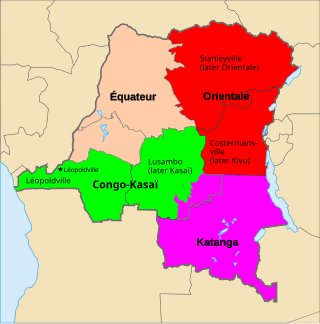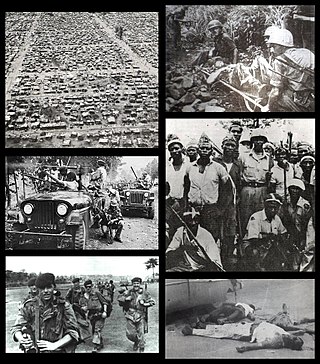| |||||
| Decades: | |||||
|---|---|---|---|---|---|
The following lists events that happened during 1921 in the Belgian Congo .
| |||||
| Decades: | |||||
|---|---|---|---|---|---|
The following lists events that happened during 1921 in the Belgian Congo .
| Date | Event |
|---|---|
| The Shinkolobwe radium and uranium mine starts production. [1] | |
| Charles Duchesne is appointed deputy governor-general of the province of Équateur. [2] | |
| 30 January | Maurice Lippens replaces Eugène Henry as governor-general |
| April | Simon Kimbangu launches the Kimbanguism religious movement, and is imprisoned for life by the authorities. [3] |
| 13 September | Cyrille Adoula, future prime minister of the Republic of the Congo (Léopoldville), is born in Léopoldville. |
| 15 September | Joseph Iléo, future prime minister of the Republic of the Congo (Léopoldville), is born |
| October | Martin Rutten (1876–1944) is appointed governor and deputy governor-general of Katanga Province. [2] |
The earliest known human settlements in what is now the Democratic Republic of the Congo have been dated back to the Middle Stone Age, approximately 90,000 years ago. The first real states, such as the Kongo, the Lunda, the Luba and Kuba, appeared south of the equatorial forest on the savannah from the 14th century onwards.

Katanga was one of the four large provinces created in the Belgian Congo in 1914. It was one of the eleven provinces of the Democratic Republic of the Congo between 1966 and 2015, when it was split into the Tanganyika, Haut-Lomami, Lualaba, and Haut-Katanga provinces. Between 1971 and 1997, its official name was Shaba Province.

The Congo Crisis was a period of political upheaval and conflict between 1960 and 1965 in the Republic of the Congo. The crisis began almost immediately after the Congo became independent from Belgium and ended, unofficially, with the entire country under the rule of Joseph-Désiré Mobutu. Constituting a series of civil wars, the Congo Crisis was also a proxy conflict in the Cold War, in which the Soviet Union and the United States supported opposing factions. Around 100,000 people are believed to have been killed during the crisis.

The Inga–Shaba EHVDC Intertie is a 1,700 kilometres (1,100 mi)-long high-voltage direct current overhead electric power transmission line in the Democratic Republic of Congo, linking the Inga hydroelectric complex at the mouth of the Congo River to mineral fields in Shaba (Katanga). It was primarily constructed by Morrison-Knudsen International, an American engineering company, with the converter equipment supplied by ASEA. Construction was completed in 1982 and it cost US$900 million. The scheme was, for many years, the longest HVDC line in the world.

The Union Minière du Haut-Katanga was a Belgian mining company which controlled and operated the mining industry in the copperbelt region in the modern-day Democratic Republic of the Congo between 1906 and 1966.

Évolué is a French label used during the colonial era to refer to an African who had "evolved" by becoming Europeanised through education or assimilation and had accepted European values and patterns of behavior. It is most commonly used to refer to individuals within the Belgian and French colonial empires. Évolués spoke French, followed European laws, usually held white-collar jobs, and lived primarily in urban areas of the colony.

Shinkolobwe, or Kasolo, or Chinkolobew, or Shainkolobwe, was a radium and uranium mine in the Haut-Katanga Province of the Democratic Republic of the Congo (DRC), located 20 km (12.4 mi) west of Likasi, 20 km (12.4 mi) south of Kambove, and about 145 km (90.1 mi) northwest of Lubumbashi.
The Forrest Group is a group of companies founded around the mining industry in 1922. As of 2018, the Forrest Group is active primarily in Central and East Africa. It is owned by George Arthur Forrest, a Belgian entrepreneur of New Zealand descent.

General elections were held in the Belgian Congo on 22 May 1960, in order to create a government to rule the country following independence as the Republic of the Congo (Congo-Léopoldville), scheduled for 30 June. The 137-seat Chamber of Deputies was elected by men over the age of 21. The seats were filled by district-based lists, although only two parties, the Mouvement National Congolais-Lumumba (MNC-L) and the Parti National du Progrès, submitted lists in more than one district.
This is a history of Katanga Province and the former independent State of Katanga, as well as the history of the region prior to colonization.

Herzekiah Andrew Shanu was a photographer recognized for his involvement in the campaign against abuses in the Congo Free State.

The Lulua people are a Bantu ethnic group settled along the Lulua River valley in south central Kasai-Occidental province, Democratic Republic of the Congo. The Lulua are in fact a collection of small groups whose home bordered by the larger Luba state and the related Songye people and Chokwe people, with whom they share a very similar culture, history, and language.
Jules Marchal was a Belgian diplomat and historian, who wrote extensively on the history of colonial exploitation in the Belgian Congo. Originally writing in Dutch, under the pseudonym A. M. Delathuy, he later published studies in French under his own name. Adam Hochschild, in his bestselling King Leopold's Ghost, praised Marchal's work as "the best scholarly overview by far, encyclopedic in scope".

The Léopoldville riots were an outbreak of civil disorder in Léopoldville in the Belgian Congo which took place in January 1959 and which were an important moment for the Congolese independence movement. The rioting occurred when members of the Alliance des Bakongo (ABAKO) political party were not allowed to assemble for a protest and colonial authorities reacted harshly. The exact death toll is not known, but at least 49 people were killed and total casualties may have been as high as 500. Following these riots, a round table conference was organized in Brussels to negotiate the terms of Congo's independence, The Congo received its independence on 30 June 1960, becoming the Republic of the Congo.

Jean Bolikango, later Bolikango Akpolokaka Gbukulu Nzete Nzube, was a Congolese educator, writer, and conservative politician. He served twice as Deputy Prime Minister of the Republic of the Congo, in September 1960 and from February to August 1962. Enjoying substantial popularity among the Bangala people, he headed the Parti de l'Unité Nationale and worked as a key opposition member in Parliament in the early 1960s.
Joseph Ngalula Mpandajila is a Congolese writer and politician.
Barthélemy Mukenge Nsumpi Shabantu was a Congolese politician who served as President of Kasaï Province from 11 June 1960 to January 1962 and July to September 1962. He was a president of the Association des Lulua-Frères, a Lulua ethnic syndicate, and a leading member of the Union National Congolaise. Though initially allied with nationalist Patrice Lumumba, he later denounced him and aligned himself with more moderate politicians. Following the division of Kasai Province in late 1962, Mukenge became Minister of Health and Minister of Social Affairs of the new Luluabourg Province. He later served as Governor of Kivu Province and on the Political Bureau of the Mouvement Populaire de la Révolution. He withdrew from politics in 1974 and died in 2018.

Congolese nationality law is the nationality law for the Democratic Republic of the Congo. It is regulated by the Constitution of the Democratic Republic of the Congo, as amended; the Congolese Nationality Code, and its revisions; the Congolese Civil Code; and various international agreements to which the country is a signatory. These laws determine who is, or is eligible to be, a national of the Democratic Republic of the Congo.
Stanley Falls District was a district of the Congo Free State. It covered most of the eastern part of the colony along the Congo River south from Stanleyville.

Georges Nzongola-Ntalaja is a Congolese academic, author, and diplomat. He is a professor of African and Afro-American Studies at the University of North Carolina at Chapel Hill, where he specialises in African and global studies. He is also the Permanent Representative of the Democratic Republic of the Congo to the United Nations since 2022.